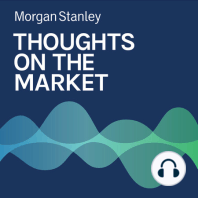3 min listen

Pharmaceuticals: The Global Obesity Challenge
Pharmaceuticals: The Global Obesity Challenge
ratings:
Length:
8 minutes
Released:
Aug 3, 2022
Format:
Podcast episode
Description
As studies begin to show that obesity medications may save lives, will governments and insurances begin to consider them preventative primary care? And how might this create opportunity in pharmaceuticals? Head of European Pharmaceuticals Mark Purcell and Head of U.S. Pharmaceuticals Terence Flynn discuss.-----Transcript-----Mark Purcell: Welcome to Thoughts on the Market. I'm Mark Purcell, Head of Morgan Stanley's European Pharmaceuticals Team. Terence Flynn: And I'm Terence Flynn, Head of the U.S. Pharmaceuticals Team. Mark Purcell: And on this special episode of Thoughts on the Market, we'll be talking about the global obesity challenge and our outlook for the next decade. It's Tuesday, August the 2nd, and it's 1 p.m. in London. Terence Flynn: And 8 a.m. in New York. Terence Flynn: So Mark, more than 650 million people worldwide are living with obesity as we speak. The personal, social and economic costs from obesity are huge. The World Health Organization estimates that obesity is responsible for 5% of all global deaths, which impacts global GDP by around 3%. Obesity is linked to over 200 health complications from osteoarthritis, to kidney disease, to early loss of vision. So tackling the obesity epidemic would impact directly or indirectly multiple sectors of the economy. Lots to talk about today, but let's start with one of the key questions here: why are we talking about all this now? Are we at an inflection point? And is the obesity narrative changing? Mark Purcell: Yeah Terence look, there's a category of medicine called GLP-1's which have been used to treat diabetes for over a decade. GLP-1 is an appetite suppressing hormone. It works on GLP-1 receptors, you could think of these as hunger receptors, and it helps to regulate how much food our bodies feel they need to consume. Therefore, these GLP-1 medicines could become an important weapon in the fight against obesity. The latest GLP-1 medicines can help individuals who are obese lose 15 to 20% of their body weight. That is equivalent to 45 to 60% of the excess weight these individuals carry in the form of fat which accumulates around the waist and important organs in our bodies such as the liver. There is a landmark obesity study called SELECT, which has been designed to answer the following key question: does weight management save lives? An interim analysis of this SELECT study is anticipated in the next two months, and our work suggests that GLP-1 medicines could deliver a 27% reduction in the risk of heart attacks, strokes and cardiovascular deaths. We believe that governments and insurance companies will broaden the reimbursement of GLP-1 medicines in obesity if they are proven to save lives. This comes at a time when new GLP-1 medicines are becoming available with increasing levels of effectiveness. It's an exciting time in the war against obesity, and we wanted to understand the implications of the SELECT study before it reads out. Terence Flynn: So, our collaborative work suggests that obesity may be the new hypertension. What exactly do we mean by that, Mark? How do we size the global opportunity and what's the timeline here? Mark Purcell: Back in the 1960s and 1970s, hypertension was seen as a lifestyle disease caused by stress and old age. Over time, it was shown that high blood pressure could be treated, and in doing so, doctors could prevent heart attacks and save lives. A new wave of medicines were introduced to the market in the mid 1980s to treat individuals with high blood pressure and doctors found the most effective way to treat high blood pressure was to use combinations of these medicines. By the end of the 1990's, the hypertension market reached $30 billion in sales, that's equivalent to over $15 billion today adjusting for inflation. Obesity is seen by many as a lifestyle disease caused by a lack of self-control when it comes to eating too much. However, obesity is now classified as a preventable chronic disease by medical associations, just l
Released:
Aug 3, 2022
Format:
Podcast episode
Titles in the series (100)
Mike Wilson: 3 Summer Surprises Investors Could Be Missing by Thoughts on the Market